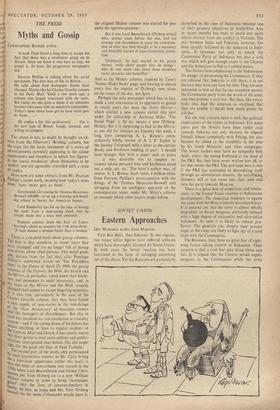THE PRESS
Myths and Gossip
CHRISTOPHER BOOKER writes :
'It took Fleet Street a long time to accept the
1/4:1 fact that there was a revolution going on in no Britain. Once we knew it was here to stay, we
■ it joined it. At least, the progressive newspapers Pearson Phillips is talking about the social revolution. The new way of life in Britain. . . .
ea He talks about how newspaper diaries have changed. Diaries like his Charles Greville column in the Daily Mail. 'Until a few years ago, a column . was largely concerned with the nobs. But today, no one gives a damn if an unknown baronet runs away with an unknown honourable. Today's news items have got to have more guts to them. . .
He smiles a lot, this professional . . . this is the new type of Briton. Tough, talented, and willing to compete.
11 The above is not, as might be thought, an ex- 1 tract from the Observer's 'Briefing' column, but the copy for the latest instalment of a series of advertisements currently appearing in the colour supplements and elsewhere, in which 'key figures' !It the 'social revolution' allow themselves to be of vodka. Puffed' and are agreeably rewarded with a crate Here now are some extracts from Mr. Pearson Phillips's recent work, showing how `today's news items' have 'more guts to them':
Greyhounds are costing Sir Thomas Houstoun- Boswall £40,000—to set up a training and breed- ing school in Surrey for American buyers.
Lord Kimberley has hit on the idea of having the teeth from a man-eating shark that he caught made into a tiara with emeralds.
Fashion opinion from the Earl of Lanes- borough, about to compere his 11th dress show: 'A man dresses a woman better than a woman.'
There is a twofold myth about gossip columns. The first is that somehow in recent years they have 'changed' and are no longer full of. boring non-stories about titled persons. This belief prob- a_blY derives from the fact that, after Penelope "illiatt's celebrated article on 'The Friendless Ones' in the Queen of April 13, 1960, the gossip Columns of the Express, the Mail, the Sketch and the Mirror, in particular, toned down their bitchi- ness and proneness to snide inaccuracy, and, in the cases of the Mirror and the Mail, actually Vtanged their names to escape lingering notoriety. is also true, particularly in the case of the Charles Greville column, that they have found a new supply of non-stories in the non-doings of the 'New Aristocracy' of boutique owners .and the managers of discotheques. But this in Itself has involved no real revolution in triviality intent---and if the toning-down of bitchiness has nn. eant anything, at least to regular students of the Express, Mail and Sketch, it has merely meant that their gossip is even more tedious and public- relations impregnated than before. Oh, one might sigh, for the good old days of Paul Tanfield. The second part of the myth, ably perpetuated ,u,Y such journalistic experts as Mr. give Irving r a television appearance earlier this year), is that this kind of non-column was started in the t.'30s when Lord Beaverbrook and Arthur Chris- 1.1-1a.118en Put Tom Driberg on to a new 'William .1.tckey' touter' column in order to bring 'champagne into the lives of caravan-dwellers in ts,erbY. In act as irony and Mr, Tom Drir (inf his, book Colonnade) would havebe it,
the original Hickey column was started for pre- cisely the opposite purpose:
But it was Lord Beaverbrook [Driberg writes] who, several years before the war, had the courage and shrewdness to essay the extermina- tion of what was then thought to be a necessary and desirable feature of mass-circulation journa- lism. . . .
`Goddamit,' he had snarled at his gossip writers, 'write about people who do things— who do real work—not about these worthless social parasites and butterflies.'
And so the Hickey column, inspired by Time's `Names Make News' page; and bearing in almost every line the imprint of Driberg's own views on the issues of the day, was horn.
Perhaps the only newspaper which has, in. fact, made a real innovation in its approach to gossip in recent years has been the Daily Mirror— which started a new column earlier this year under the editorship of Anthony Miles. The Inside Page' is by no means a new Driberg- Hickey. But it is surprising to find in the Mirror, as one did for instance on Tuesday this week, a long item comparing A. L. Rowse's extra- ordinarily bitchy review of A. J. P. Taylor in the Sunday Telegraph with a letter in the current Books and Bookmen reading, in part : 'I should have thought that with a paper such as yours . . . it was desirable not to employ re- viewers whose personal bias and bitchiness stand out a mile, etc. etc.' The letter's author was, of course, A. L. Rowse. Such items, a million miles from Pearson Phillips's preoccupation with the doings of Sir Thomas Houstoun-Boswall and springing from an intelligent appraisal of the contemporary scene, make Mr. Miles's column an example which other papers might follow.






































 Previous page
Previous page